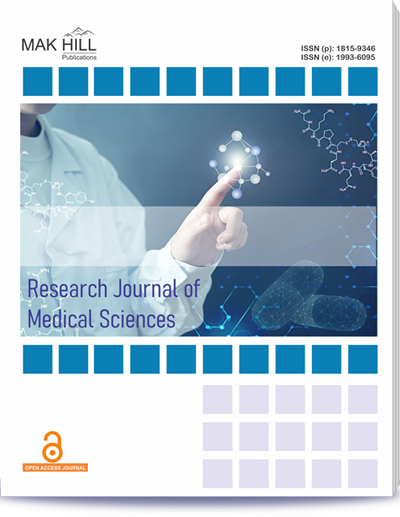
Research Journal of Medical Sciences
ISSN: Online 1993-6095ISSN: Print 1815-9346
132
Views
14
Downloads
Abstract
Visual impairments have psychological, social and economic ramifications they play an important role in determining one's quality of life. The best treatment option for visual rehabilitation is still corneal transplantation, but efforts to solve this issue are still hampered by a global lack of suitable donors. To assess the knowledge, attitude practices of eye donation among medical and healthcare professionals in a tertiary care hospital in south India. The 200 medical students, resident physicians nursing staff members of the Sree Mookambika Institute of Medical Sciences in Kulasekharam were surveyed for this cross‐sectional study using a standardized questionnaire and a convenience sampling technique. The study was carried out between January and March of 2024, a duration of three months. The awareness of eye donation and readiness to donate eyes were measured using a standardized questionnaire (10 questions for knowledge and 4 questions for attitude). Responses regarding attitude were divided into positive and negative categories, while responses regarding knowledge were ranked as excellent, good and poor. SPSS 20.0 was used to analyze the data Fisher's exact test and the Chi square test were used to determine whether there was a correlation. The mean (SD) age of the 200 participants was 28.45±4.52 years, with 102 (51%) falling between the ages of 18 and 25. Age and awareness of eye donation did not significantly correlate (p=0.45). Approximately 151 (75.5%) participants acquired knowledge about eye donation through media. The majority of research participants were informed that corneas must be collected within six hours of death and that eye bank staff should be notified. Only 22 (11%) of the study participants were aware of the hospital corneal retrieval program. In answer to the willingness to donate their eyeballs, 57 (28.5%) people responded positively. Furthermore, the question about unwillingness to give eyeballs elicited a mixed response, with 141 (70.5%) being unwilling due to familial objection. (p<0.05). The knowledge and attitude scores differed significantly between the groups (p = 0.01 and p<0.001, respectively). There was considerable awareness regarding eye donation, but health professionals showed an unacceptably low desire to volunteer their eyes for donation. Thus, it is crucial that knowledgeable, sensitive physicians provide prompt counseling to both patients and bystanders.
How to cite this article:
S. Veeralakshmanan, S.A. Arsha Ressal, Biju Gopal, R. Rinita and Rajeevan . Knowledge and Attitude Regarding Eye Donation Among Medical Students and Graduates in a Tertiary Care Centre.
DOI: https://doi.org/10.36478/10.36478/makrjms.2024.7.172.177
URL: https://www.makhillpublications.co/view-article/1815-9346/10.36478/makrjms.2024.7.172.177